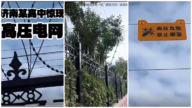【新唐人2011年10月13日訊】溫州高利貸事件受到各方的關注,是否會引爆中小企業金融危機?專家剖析,這個現象暴露了溫州複雜的高利借貸關係,與中小企業借錢不易的問題。專家認為,中共當局壓制消息,中國目前正大量的發生著溫州模式高利貸金融危機。請看本臺記者的報導。
中國執行貨幣緊縮政策一年多來,存準率飆升到21.5%,民間借貸成了中小企業的資金供應鏈。《南方日報》報導,溫州模式在中國大陸一直被當成民間金融的試驗地區和榜樣,規模龐大的民間借貸為溫州中小企業提供了新的融資途徑。不過今年以來已有90多個老闆因資金周轉困難,欠下巨額債務後「跑路」。
據大陸民間企業的一項調研——「小企業經營與融資困境調研報告」顯示,溫州地區有50%的小型企業是透過民間借貸完成融資,這些資金89%來自家庭或個人;59.67%來自企業參與的民間借貸市場。溫州官方的文件也證實,溫州當地民間借貸規模相當於溫州全市銀行貸款的1/5。
根據里昂證券的報告,溫州民間未償貸款總量可能高達人民幣8000億元到1萬億元,估計今年有10%到15%的未償貸款將會變成壞賬。不過,近幾天,溫州銀監局官員否認了溫州的民間信貸規模有里昂證券統計的那麼大。
經濟評論員傑森表示,溫州這次資金鏈斷裂,並不是溫州一個地方的事,其他地方也陸續都有這樣的事件出現。
傑森:「這個事在溫州首先發生是因為這樣搞得太兇,浙江這一帶搞得最兇,整個民間貸款有時候利率可以到百分之一百多,但是呢,就是說其他地方呢,也都有像這樣事情出現,比如說天津、比如說內蒙、比如說山西、比如說山東,1001表現上,就是說很多我們中小型的房地產企業,已經出現了落了油現象,就是說資金鏈已經夠不上了,他就扔下跑了這樣事情。」
傑森分析指出,中共一直將數據往下壓,甚至動用官方媒體壓制真相,他說,不要認為未來在中共媒體上看不到這些消息,中國就沒有這些事情發生,其實很可能在暗處正大量的發生著。
大陸經濟學家綦彥臣表示,銀行將大部分的錢貸給了國企,最終導致民間高利貸盛行,以致民營中小企業受害。民營企業承擔中國經濟市場發展,提供政府稅收以及農民工就業等,社會效益高,他認為,民營企業可以要求政府救助。
綦彥臣:「今天導致高利貸風險是國家金融壟斷的惡果,他們有責任對自己政策錯誤進行反省,或者一種自我救贖這種方法。」
《21世紀經濟報導》,內蒙古鄂爾多斯的高利貸市場緊急收縮,因擔憂壞賬風險,諸多放貸人卻步。此外,深圳、廣州等熱點地區借貸機構都在近期放緩了放貸節奏,不過利率仍然維持高位。
新唐人記者梁欣、李庭、黎安安採訪報導。
Usury Incident Reflects China』 Economy State
The recent Wenzhou usury incident unsettled many Chinese,
will this set off small and mid-sized firms』 financial crisis?
Experts analyze that this incident has exposed the complex
relationship of loan sharks and the problems of borrowing money.
They believe that the Chinese authorities are
hiding the true situation.
However, China is undergoing lots of Wenzhou-modelled
usurious crises.
Since last year, China started implementing the monetary
policy, and the bank deposit rate has risen up to 21.5%,
private lending has become a main supplier to small firms.
Nanfang Daily reported that the Wenzhou model was used
as a test and example. Large-scale private lending
provides a new source of funding.
However, over 90 bosses couldn』t repay the loans and fled.
According to a survey on mainland private firms, 50% of
small companies』 funds in Wenzhou are from private lending,
89% of these funds are from families or individuals. Ca. 60%
of the enterprises participate in the private lending market.
Wenzhou』s official document shows that private lending
accounts for 1/5 of the bank』s loan.
CLSA reported that the total private outstanding loans in
Wenzhou went from RMB800 billion to RMB1000 billion.
Analysts estimate that 10% to 15% of outstanding loans will
turn into bad debts this year.
Wenzhou banking officials denied these numbers, saying that
the scale of private loans is not as high as CLSA』s statistics.
Jason Ma, an economic commentator, said that what
happened in Wenzhou also happened in other cities.
Jason Ma: “It happened in Wenzhou first because they are
going to extremes. Zhejiang province is the worst,
the private lending rate rose over 100%, the same occurred in
many other places, such as in Tianjin, Mongolia
and Shangdong. Many of our small and mid-sized estate
companies cannot repay the loans, so they have to flee."
Jason Ma points out that the Chinese Communist Part (CCP)
hides the true figures of the loans from the public,
particularly using it』s mouthpiece media to cover up the truth.
Jason explained that if you don』t see CCP media reporting it,.
that doesn』t mean nothing is happening, on the
contrary, a lot of things are happening in the dark.
Mainland economist, Qi Yanchen, said banks lend money to
state-owned companies, resulting in prevalence of civil usury,
so that the small and mid-sized companies suffer.
The private enterprises take the leading role
in China』s economy market, creating jobs and revenue. Qi
believes private enterprises should require government help.
Qi Yanchen: “The state monopolized finance,
and is the leading cause of today』s usury financial crisis,
the government has the responsibility to correct its mistakes."
The 21st Century Business Herald reported that
Inner Mongolia Erdos is easing the usury market
due to the risks of incurring the bad debts.
Shenzhen, Guangzhou and other cities are also alerted
of the risks. However, the loan interests are still rising up.
NTD reporters Liang Xin, Li Ting and Li Anan.





























